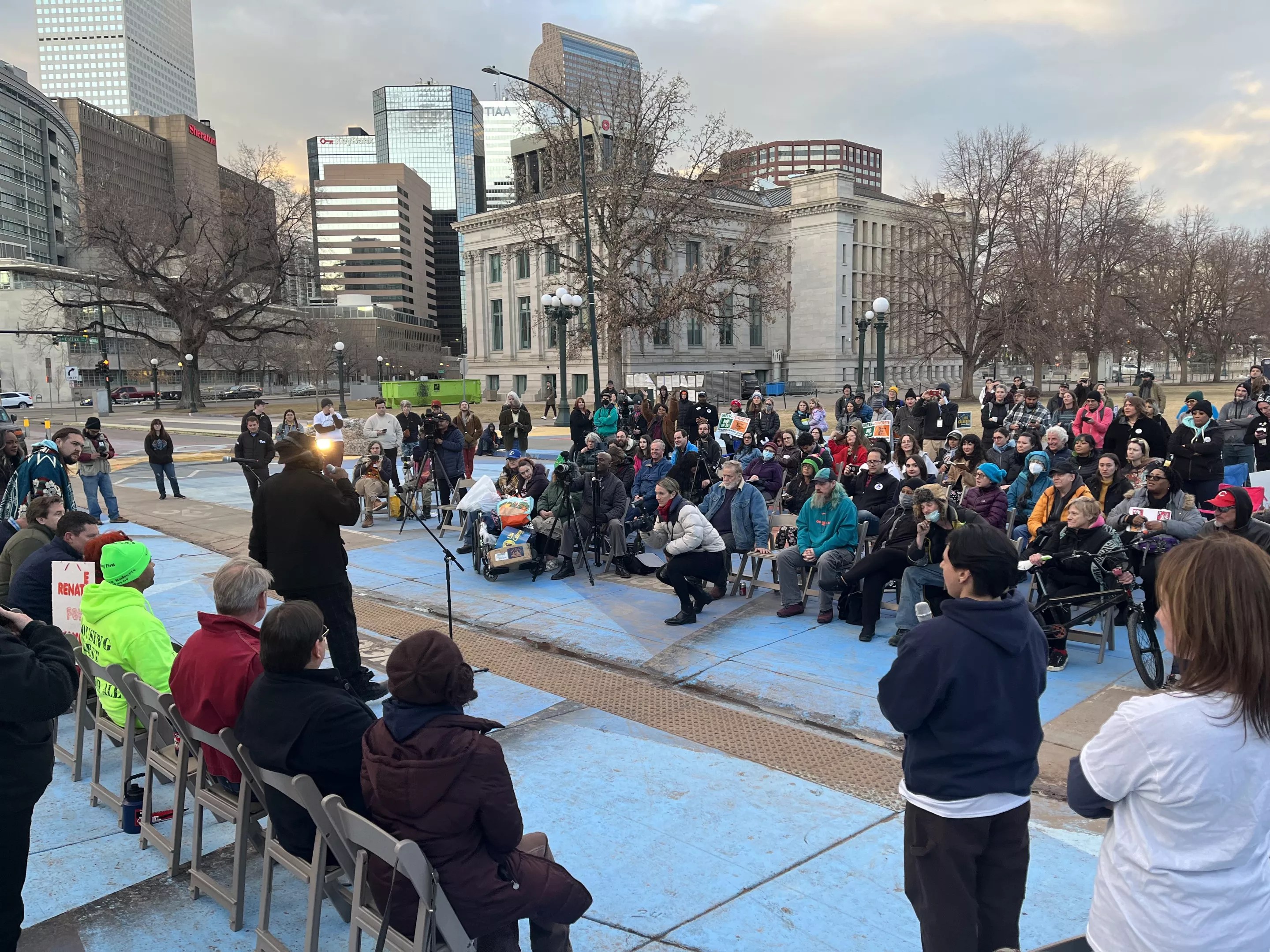
Conor McCormick-Cavanagh

Audio By Carbonatix
Despite Denver City Council not meeting in chambers on Monday, February 20, because of the Presidents’ Day holiday, there was plenty of action around the City and County Building.
“Housing is a human right. We need more public housing,” mayoral candidate Terrance Roberts said at a forum outside of City Hall that saw advocates and people experiencing homelessness asking questions of a bevy of candidates running to be Denver’s next chief executive. “We need to scrap this conversation about affordable housing. Affordable to whom?”
Housekeys Action Network Denver and Mutual Aid Monday co-organized the event, which began in the late afternoon and included commentary from twelve mayoral candidates.
While most of the seventeen candidates on the ballot to succeed term-limited Mayor Michael Hancock showed up, four candidates – Kwame Spearman, Debbie Ortega, Aurelio Martinez and Al Gardner – did not attend the forum. While Kelly Brough did not attend either, she sent Denise Maes, a representative from her campaign, in her stead.
The forum marked an opportunity for candidates with close ties to homeless-rights advocates, such as Lisa Calderón and Ean Tafoya, to speak in solidarity with the couple of hundred people who had gathered for the event.
“I’m running to stop the inhumane, ineffective, expensive sweeps,” Calderón said to cheers from the crowd. “We will replace them with housing and services.”
Added Tafoya, who noted that he’d been radicalized by the advocacy group Denver Homeless Out Loud, “We have to be moving away from sheltering people in this congregate living.”
The format first offered candidates a chance to stand or remain seated to show support or opposition while a host read out policy questions. During this period, Andy Rougeot, a Republican running for mayor in deep-blue Denver, generated boos from audience members who saw him sit when candidates were asked if they’d stop sweeps in general or stop encampment sweeps when the weather dipped below freezing. Rougeot then stood when candidates were asked if they’d arrest people living in tents who won’t go into shelters or safe-camping sites.
“What an asshole,” an audience member said out loud of Rougeot, who continued with both his prepared remarks and answers to questions despite facing a hostile crowd.

The forum brought out a large crowd in front of the City and County Building.
Conor McCormick-Cavanagh
And while there was also disagreement between candidates about whether fentanyl use should be criminalized and whether Denver should establish supervised drug-use sites, they unanimously agreed that the City of Denver should provide more funding and training for case managers and use public dollars to pay for substance-abuse treatment when Medicaid won’t cover these costs.
Many of the candidates also agreed that Denver’s current shelter system wasn’t meeting the needs of people experiencing homelessness.
As opposed to typical political debates, in which a host can call out candidates who dance around questions or simply speak about a totally different topic, at this event the audience was able to jeer at the candidates when they gave indirect answers.
There was also one woman in the crowd who provided continuous humorous interjections, shouting to one candidate as he answered a question about the use of psychedelics for therapeutic purposes, “Have you ever taken mushrooms?”
Following the sitting-and-standing answer period, people experiencing homelessness also got to ask questions directly of candidates. “I want to know why Colorado can’t afford to fucking help homeless people,” one audience member said.
Candidates such as Leslie Herod and Mike Johnston plugged their past accomplishments in relation to homelessness during the forum.
For example, Herod spoke about getting voter approval for Caring 4 Denver, a sales tax increase that helps fund mental health treatment and crisis intervention in the Mile High City. And Johnston talked about pushing Proposition 123, a statewide initiative approved by voters in November that aims to generate about $300 million per year to help fund affordable housing.
“My belief is that no one in this city needs to be unhoused,” Johnston said.
And other candidates, such as Renate Behrens, who talked about her own experience with homelessness, offered crowd-pleasing statements such as, “There should not be any difference between housed people and unhoused people.”
Even Thomas Wolf, a finance professional who acknowledged that the audience might see him as a “big, bad wolf,” generated some approval from the crowd when he said that the city was storing seized cannabis at the site of the former jail.
“We are being more humane to confiscated cannabis than we are to you all,” Wolf said.
The first round of voting in Denver mayor’s race takes place on April 4. If no candidate gets more than 50 percent of the vote, then the top two vote-getters will head to a runoff on June 6.